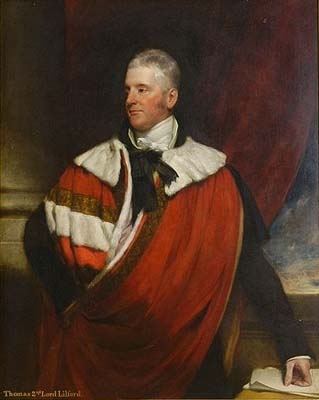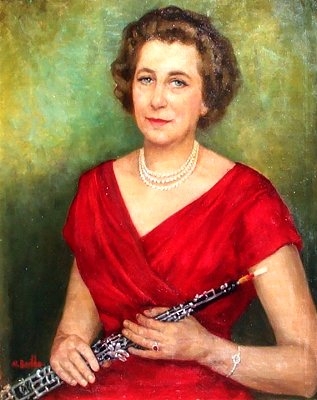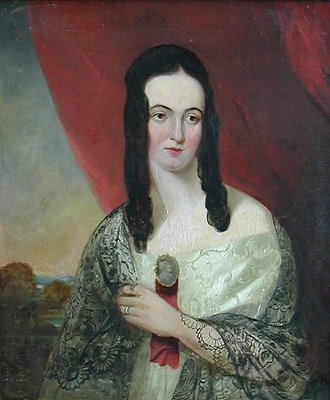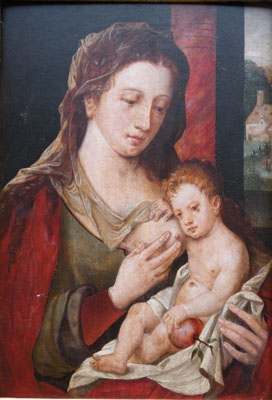inscribed on an old label attached to the reverse of the canvas with the identity of the sitter
Barrington, William Wildman, the second Viscount Barrington (1717?1793), politician, was born in Beckett, near Faringdon, Berkshire, on 15 January 1717, the eldest son of John Shute Barrington, first Viscount Barrington (1678?1734), politician, and his wife, Anne Daines (d. 1763), the daughter of Sir William Daines. He had five brothers, including John Barrington, who became a major-general; Samuel Barrington, later vice-admiral of the white; Daines Barrington, a judge and natural philosopher; and Shute Barrington, bishop of Durham. There were also three sisters: Sarah, mother of the writer and rural improver Uvedale Price, Anne, and Mary. The family''s country seat at Beckett was a small house that had been attacked and burnt during the civil war.
After having received his education under a Mr Graham, the father of Sir Robert Graham, one of the barons of the court of exchequer, Barrington succeeded to the peerage on 14 December 1734. At the age of eighteen he went to Geneva and proceeded from there on the grand tour. He returned to England in 1738 and on 13 March 1740 was elected as a member for Berwick upon Tweed. On 16 September 1740 he married Mary Grimston (d. 1764), the daughter of Henry Lovell and Mary Cole, and the widow of the Hon. Samuel Grimston. The couple had no children and the marriage seems to have been an unhappy one: there was a rumour, for example, that Barrington had a liaison with Lady Harrington, the wife of the commander of the Horse Grenadier Guards, until 1770. He had a very ingratiating manner at times, with both political colleagues and acquaintances of the opposite sex. In 1771 the Town and Country Magazine described him thus: He is in person genteel and well made, though under the middle size; his features rather delicate than masculine; his address gracious and engaging, particularly to the ladies; and he possesses a spirit of liberality towards them that never fails to please. (Town and Country Magazine, 8, 1771, 10).
Barrington''s political career was notorious because he held continuous public office for over thirty years throughout a whole series of ministerial changes. This long tenure of office drew much contemporary criticism, and for long the accepted verdict was that Barrington was a sycophantic time-server. Modern reassessment is that he was the quintessential politician?administrator in an age when the civil service had not yet separated from politics, and a man of principle who contributed much to the development of the administration of government in Britain. On entering parliament, Barrington, in contrast with his later career, was associated with the opposition to Walpole''s government. His maiden speech on 2 March 1741 was against a bill which sought to revive a scheme empowering justices of the peace to issue warrants in search of seamen. He remained in opposition after Walpole''s fall in 1742 until 1744, when, with the Cobham group, he went over to government. In February 1746 he was appointed a lord of the Admiralty and thus embarked on a long and unbroken career in public service. As his brother Shute noted, once the folly of opposition and the rectitude of duty were ?offered to his mind, the force and truth of them became irresistible? (Barrington, 11).
Barrington quickly gained a reputation as an effective administrator and, at George II''s request for a man of economies, he was appointed to the office of the master of the great wardrobe in 1754. He had applied to the duke of Newcastle for a seat on the Treasury board, and got a better post instead. Thereafter he never asked for office, always taking what he was given. Masters of the wardrobe had political influence and could still progress to higher office. Their duties involved providing the daily necessities of the king''s court and creating the ceremonial background of the king''s life. While in office Barrington continued with the process of economizing which had been initiated by his predecessor Sir Thomas Robinson. The year 1754 also saw him elected at Plymouth, which remained his constituency until his retirement in May 1778. A year later, in 1755, he became secretary at war, a post he held, in two spells, for nineteen years. If one added the allowances he received in addition to his salary, the secretary at war was paid only a little less than a secretary of state. This was an opportune appointment, for up to that time he had been relying heavily on his wife''s finances to bolster his own. By the 1760s Barrington was enjoying more of the pleasures of life. His home in Cavendish Square, London, was the venue for parties, and opera became a major interest of his. The dour image of him as merely a punctilious administrator is a false one.
Barrington now settled into a long association with the army which continued in the first instance until March 1761, and then from July 1765 until December 1778. During the intervening years, much to his surprise, in March 1761 he was appointed chancellor of the exchequer as one of the many personnel changes that accompanied the early years of the succession of George III. When the duke of Newcastle resigned and Lord Bute, the king''s mentor, became first lord of the Treasury, in May 1762 Barrington became treasurer of the navy, and served until 1765. The bulk of his career was thus involved in the administration of Britain''s forces.
Animosity towards Barrington intensified during the 1760s. He was already unpopular as a result of his part in the Minorca disaster of 1756. Confusion had arisen as to whether Governor Fowke of Gibraltar should have relieved Minorca during a siege by offering military support. A series of letters sent by Barrington to Fowke became the centrepiece of the debate as to the propriety of Fowke''s actions. Admiral Byng was shot for his part in the disaster, and Barrington had taken a firm line against him. However, when Governor Fowke was tried, Barrington was at pains to exonerate himself. Barrington was later taunted for this by Junius and others. In addition, during the 1760s he was castigated as the one who remained in office while others fell from grace. The personnel changes that came as a consequence of groups of politicians losing or gaining influence and office did not affect him. He was particularly attacked for staying in office when his patron the duke of Newcastle resigned in 1762. Barrington had been kept at the war office in 1756 by the duke, but he refused to join Newcastle in opposition in 1762, despite admitting his debt of gratitude to him. He further incurred the wrath of the satirical writers when he praised the conduct of the guards in dealing with the Wilkes riots in 1768. Barrington was eager to support his men, but his actions were attacked in the press and the use of the army in dealing with public unrest was debated in the house. Junius continued his attack on Barrington when the latter parted company with Christopher D''Oyly, his deputy secretary, in December 1771. Barrington was a particular target of Junius (namely Philip Francis) who as first clerk at the war office from 1763 to 1772 served under Barrington, and Barrington''s historical reputation was coloured by these attacks. Junius announced in January 1772 in a private letter to the printer William Woodfall: ?Having nothing better to do, I propose to entertain myself and the public, with torturing that bloody wretch Barrington? (Letters of Junius, 386).
Barrington was highly regarded within government for his efficiency and integrity. While at the war office he gained the respect of officers and soldiers alike. Captain Alexander Mackintosh noted that ?such officers as have not interest at court, and nothing to plead but merit, or long services, have found in your Lordship an asserter of their rights? (A. Mackintosh to Lord Barrington, 7 Dec 1775, Suffolk RO, HA 174/1026/6a/4). George III held a good opinion of him, and trusted him to such an extent that he used him to sound out Lord North on his willingness to head the government in 1770. This good relationship with the king, which was such an integral and important part of the administration of the army, sustained Barrington into the 1770s. In 1760 Newcastle described him as ?the best Secretary at War that ever was? (Newcastle MSS, BL, Add. MS 32916, fols. 49?55). In 1763 he was informed by Lord Halifax that George III had stopped Pitt from removing him from the war office in the spring of that same year. This high opinion arose out of Barrington''s effective and reforming administration. During his first period at the war office he began to reform its procedures and regulations, but these reforms were not finally completed until his second tenure. The peacetime years were particularly important in this regard. George III was instrumental in supporting his initiatives. Careful management and frugality were given importance, as was the necessity of drawing up procedures to inform good conduct and practice. A brave and difficult attempt was also made to improve the way preferment was recommended and how commissions were bought and sold. Enemies were made within the political world as a result of these changes and because of his resistance to patronage pressure.
Although Barrington made his mark as an administrator rather than as a politician he was a frequent Commons speaker, and a more than competent debater. Horace Walpole named him in 1755 as one of the twenty-eight best speakers in the house, despite ?a lisp and a tedious precision? (Walpole, Memoirs, 2.115). He spoke mainly on military matters, but took a leading part in the Middlesex election case, moving the expulsion of John Wilkes on 3 February 1769. On America he was a hardliner, firm in his view that the king''s subjects everywhere owed obedience to parliament. When the American war began he personally favoured withdrawal of the army and the use of the navy to reduce the colonies to submission. He therefore found his post increasingly disagreeable, and he had also grown tired of the constant applications for commissions. In March 1775 he described himself as ?a baker in a famine, his shop crowded with customers, and very little bread to give them? (Barrington, chap. 9). He first asked to resign that year, and the king finally permitted him to retire in December 1778, when he was given a pension of ?2000 for his public service.
Apart from a brief period as postmaster-general from January to April 1782, Barrington found his public career had thus come to an end. There was, and has since been, disagreement about his motives. In a debate on the supply of the army, on 24 January 1770, he set out a justification of his career. To those who had witnessed his willingness to stay in office through numerous changes of administration such a justification struck them as an outrage. ?The very name of Barrington?, exclaimed Junius in 1772, ?implies everything that is mean, cruel, false and contemptible? (Letters of Junius, 499). Criticisms were widespread among Barrington''s contemporaries, but George III correctly perceived him as a faithful servant of the state. He was both forward- and backward-looking. His administrative role foreshadowed much of the work of the present day civil service, while he rejected the development of party discipline, which was in its infancy in the eighteenth century. Barrington was not out of step in claiming that it was the duty of politicians to serve the crown regardless of other affiliations. This was his justification to Newcastle in 1762. In essence it was those politicians, such as the Rockinghams, who tried to force themselves on the king who were breaking new ground. Barrington believed that government was ?a duty whilst an honest man could support it? (Barrington to Sir Andrew Mitchell, 5 Dec 1762, Mitchell MSS, BL, Add. MS 6839, fol. 42). This did not mean blind duty, but a commitment as long as the administration was governing for the country''s benefit. He claimed that the ?best and most moderate when formed into a party, may be carried lengths they never intended to go. I therefore stopped at the threshold? (ibid.). This was a clear reference to early abandonment of political opposition.
References to Barrington in available contemporary documentation tend to emphasize the low opinion in which he was held by many of the influential politicians of the age. He was not willing to be a pawn in their political machinations. Yet this dutiful servant had come to be respected by those who appreciated his skills of organization and attention to detail. Both he and others realized the significance of efficient administration in effective government. Barrington did not involve himself in the power struggles of the age, and thus became a thorn in many a side. Nevertheless, he inspired friendship and respect, not least among the less privileged he helped in the army. When he died, on 1 February 1793 in Cavendish Square, London, even Horace Walpole, his long-term enemy, realized that he would miss him. He was buried in Shrivenham church, Berkshire, and was succeeded as viscount by his nephew William Barrington, the son of John Barrington.
As Barrington''s title was in the Peerage of Ireland it did not entitle him to a seat in the British House of Lords. In March 1740 he was returned to the House of Commons as Member of Parliament for Berwick-upon-Tweed. Having taken his seat in the Irish House of Lords in 1745, he was appointed one of the Lords Commissioners of the Admiralty in 1746, and was one of the ''managers'' of the impeachment of Lord Lovat.
In 1754, he became Member of Parliament for Plymouth. In 1755 he was made a Privy Counsellor and appointed as Secretary at War in the cabinet of the Duke of Newcastle - a post which held for the next six years throughout the Seven Years War. During this period his brother led an expedition that captured Guadeloupe.
In 1761 was transferred to the office of Chancellor of the Exchequer. In 1762 he became Treasurer of the Navy, and in 1765 returned to his former position of secretary at war. He retained this office until December 1778, and during four months in 1782 was joint postmaster-general.
Lord Barrington married Mary, daughter of Henry Lovell and widow of the Hon. Samuel Grimston, in 1740. There were no surviving children from the marriage. She died in September 1764. Barrington remained a widower until his death at his country estate, Beckett Hall at Shrivenham in Berkshire (now Oxfordshire), in February 1893, aged 76. He was buried in the parish church, Shrivenham. His nephew William Barrington succeeded in the viscountcy.
The Barrington family and thence by descent.
Allan Ramsay was born in Edinburgh, Scotland, the eldest son of Allan Ramsay, poet and author of The Gentle Shepherd. From the age of twenty he studied in London under the Swedish painter Hans Hysing, and at the St. Martin''s Lane Academy; leaving in 1736 for Rome and Naples, where he worked for three years under Francesco Solimena and Imperiali (Francesco Fernandi). On his return in 1738 he first settled in Edinburgh, attracting attention by his head of Duncan Forbes of Culloden and his full-length portrait of the Duke of Argyll, later used on Royal Bank of Scotland banknotes. He later moved to London, where he was employed by the Duke of Bridgewater. His pleasant manners and varied culture, not less than his artistic skill, contributed to render him popular. His only serious competitor was Thomas Hudson, with whom he shared a drapery painter, Joseph van Aken. In 1739 he married his first wife, Anne Bayne, the daughter of a professor of Scots law at Edinburgh, Alexander Bayne of Rires (c.1684?1737), and Mary Carstairs (1695??1759). None of their 3 children survived childhood, and she died on 4 February 1743 giving birth to the third of them. One of his drawing pupils was Margaret Lindsay, eldest daughter of Sir Alexander Lindsay of Evelick and Amelia Murray (granddaughter to David Murray, 5th Viscount of Stormont and sister to the naval officer John Lindsay). He later eloped with her and on 1 March 1752 they married in the Canongate Kirk, Edinburgh, though her father never forgave her for marrying an artist.
Ramsay already had to maintain a daughter from his previous marriage as well as his two surviving sisters, but told Sir Alexander that he could provide Margaret with an annual income of ?100 which would increase ?as my affairs increase, and I thank God, they are in a way of increasing? and that his only motive for the marriage was ?my love for your Daughter, who, I am sensible, is entitled to much more than ever I shall have to bestow upon her?.[1] There were three surviving children from their long and happy marriage, Amelia (1755?1813), Charlotte (1758?1818?), and John (1768?1845).
Ramsay and his new wife spent 1754?1757 together in Italy, going to Rome, Florence, Naples and Tivoli, researching, painting and drawing old masters, antiquities and archaeological sites, and (to earn an income) painting Grand Tourists'' portraits. This and other trips to Italy involved more literary and antiquarian research than art. After their return, he was in 1761 appointed to succeed John Shackelton as Principal Painter in Ordinary to George III, beating Hudson to the post; and so fully employed was he on the royal portraits which the king was in the habit of presenting to ambassadors and colonial governors, that he was forced to take advantage of the services of a host of assistants?of whom David Martin and Philip Reinagle are the best known.
He gave up painting in about 1770 to concentrate on literary pursuits, his health shattered by an accidental dislocation of the right arm and his second wife''s death in 1782. With unflinching pertinacity, he struggled until he had completed a likeness of the king upon which he was engaged at the time, and then started for his beloved Italy, leaving behind him a series of fifty royal portraits to be completed by his assistant Reinagle. For several years he lingered in the south, his constitution finally broken. He died at Dover on 10 August 1784.
Antiques.co.uk Ref: 4V8CDYXU
- Materials:
- Oil on Canvas
- Width (cm):
- 91.44 x 71.12 cm 36.00 x 28.00 ins














